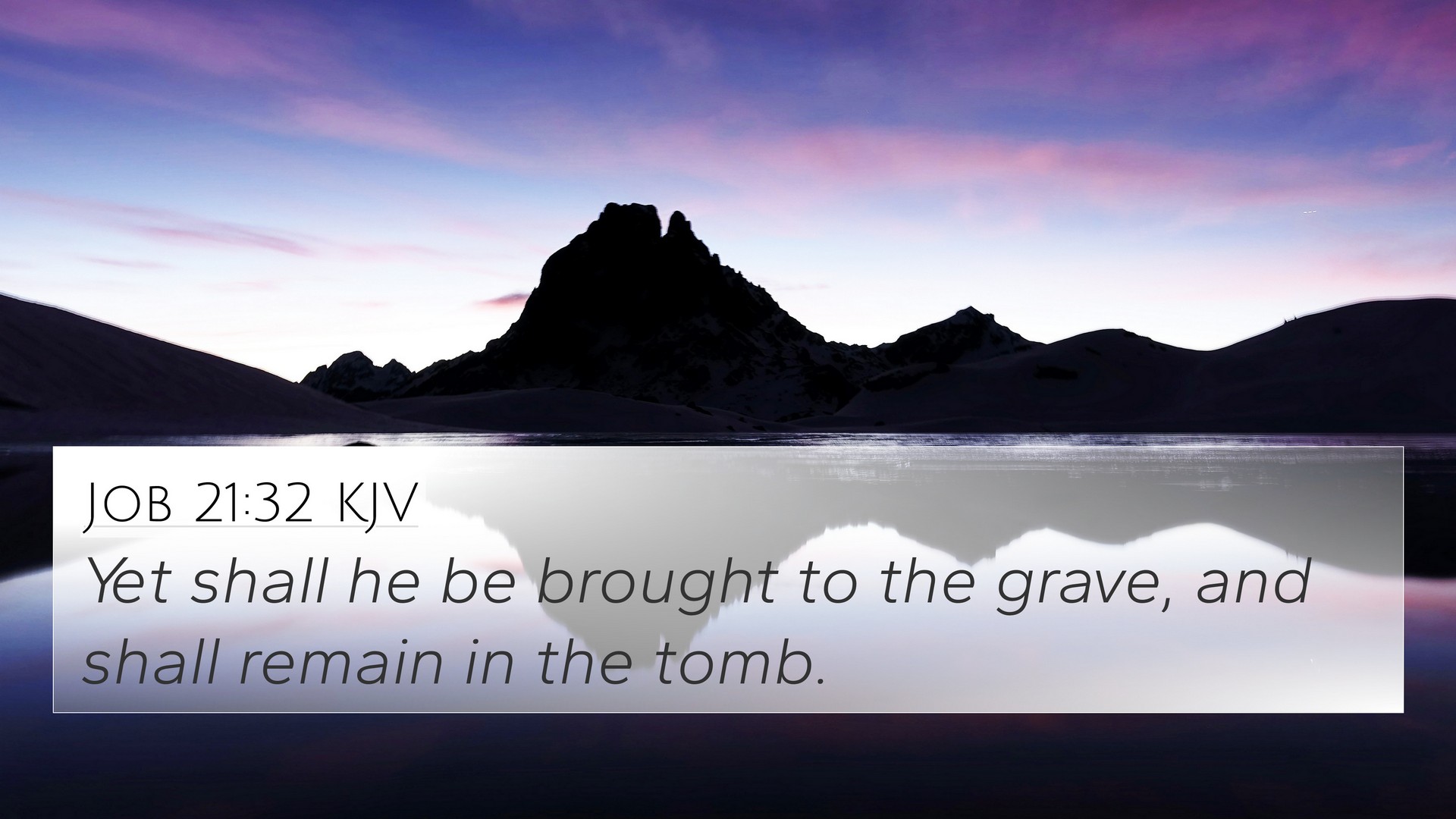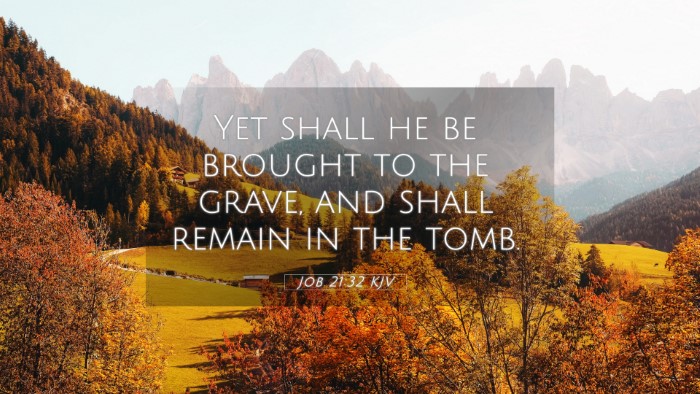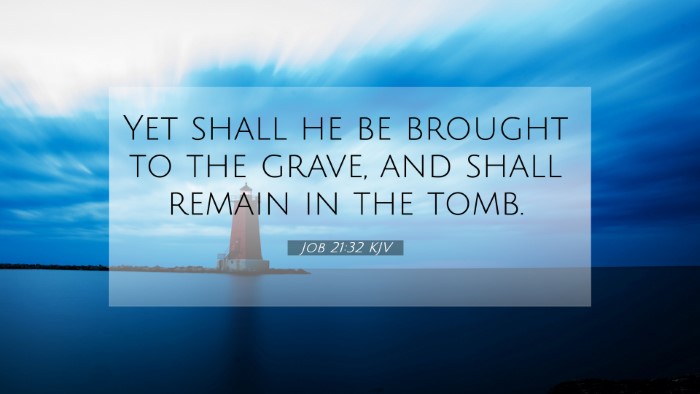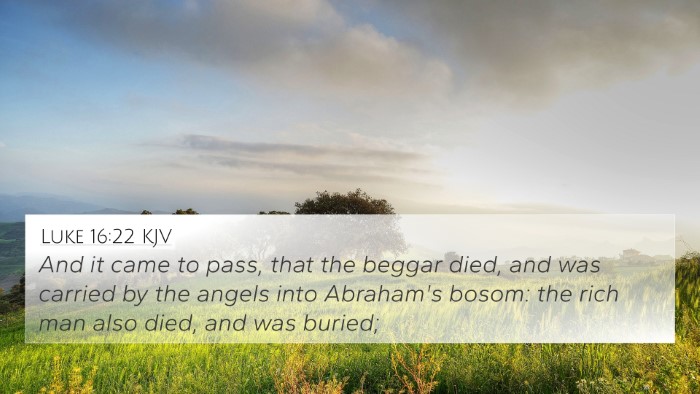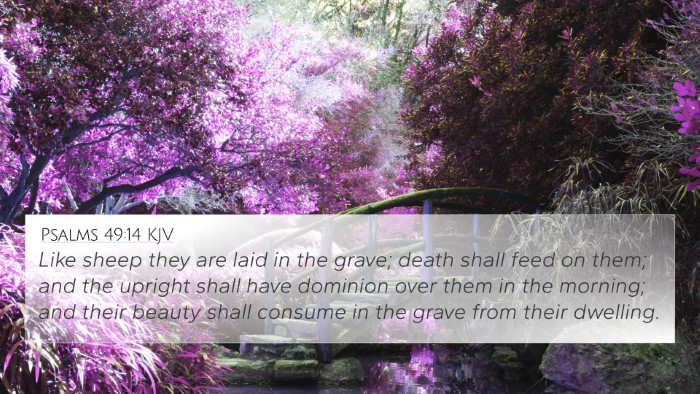Understanding Job 21:32
Job 21:32: "Yet shall he be brought to the grave, and shall remain in the tomb."
This verse speaks to the inevitable reality of death and the finality of the grave. In the context of the book of Job, it is a reflection on the fate of the wicked and the seeming prosperity of the ungodly.
Insights from Public Domain Commentaries
Matthew Henry's Commentary
Matthew Henry elaborates on the state of the ungodly after death. He emphasizes that though they may have lived in luxury and pride, in the end, they face the same fate as anyone else—death. In this verse, Henry notes that death does not discriminate based on wealth or status.
Albert Barnes' Notes on the Bible
Barnes points out the contrast between the prosperity in life and the reality of death. He explains that the grave is a leveler; it brings all individuals, regardless of their earthly circumstances, to the same end. He suggests that this is both a warning and an assurance, reminding readers of the transient nature of life and the certainty of death.
Adam Clarke's Commentary
Adam Clarke emphasizes the phrase "shall remain in the tomb." He interprets this as a statement about the permanence and stillness of death. Clarke underlines that this reinforces the idea that there is no continuing earthly existence after death, and he discusses how this notion can encourage a consideration of one’s life choices and responsibilities.
Thematic Bible Verse Connections
Job 21:32 resonates with several themes found throughout the Scriptures. Here are some relevant Bible cross-references:
- Ecclesiastes 3:20: "All go to one place; all are from the dust, and to dust, all return." This verse emphasizes the common fate of all humanity.
- Psalms 49:12: "But man in his pomp will not remain; he is like the beasts that perish." This highlights the fleeting nature of life.
- Hebrews 9:27: "And just as it is appointed for man to die once, and after that comes judgment." This verse stresses the inevitability of death.
- Job 14:14: "If a man dies, shall he live again? All the days of my service I would wait, till my renewal should come." This speaks to Job’s contemplation of life after death.
- Isaiah 14:11: "Your pomp is brought down to Sheol, the sound of your harps; maggots are the bed beneath you, and worms are your covering." This illustrates the humbling nature of death.
- Luke 16:22-23: The story of Lazarus and the rich man highlights the contrast between the fates of the righteous and the unrighteous after death.
- 1 Peter 1:24: "For 'All flesh is like grass and all its glory like the flower of grass. The grass withers, and the flower falls.'" This further emphasizes the temporary nature of earthly life.
Comparative Bible Verse Analysis
When analyzing Job 21:32 comparatively, the connection between this verse and others enhances its understanding:
For instance, Job's lament about the fate of the wicked can be paralleled with Psalms 37:2, which states, "For they will soon fade like the grass and wither like the green herb." Such cross-referencing allows for a deeper exploration of the biblical theme surrounding mortality and justice.
Scriptural Cross-Referencing
The act of cross-referencing biblical texts is essential for a comprehensive understanding of scripture. Tools for Bible cross-referencing, such as a Bible concordance or a Bible reference resource, can facilitate this study. When engaging with Job 21:32 and its themes, consider using a Bible cross-reference guide to explore related verses and concepts.
Conclusion
In conclusion, Job 21:32 serves as a poignant reminder of the certainty of death and the universal fate that awaits humanity. Through the insights provided by various biblical commentaries and the connections drawn to related scriptures, one gains a deeper understanding of this verse in the context of life, death, and divine justice.
